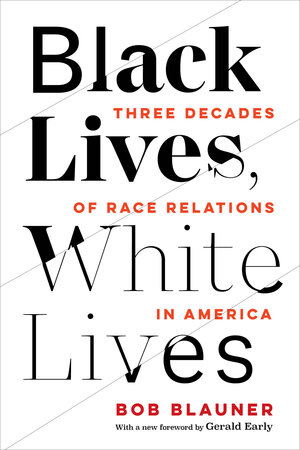The Book
Black Lives, White Lives: Three Decades of Race Relations in America
The Author(s)
Bob Blauner

With a country as large and as diverse as the United States, writing a truly national history, of any kind, is a tall order indeed. By necessity, shortcuts have to be taken, entire regions have to be underemphasized or left out altogether, and ever-present exceptions to the rules have to be minimized. Forty years ago, while I was on a post-doctoral fellowship in Norway, one of my Norwegian cousins used to ask me questions like, “What is the weather like today in America?” While I struggled to come up with an answer that encompassed the meteorological realities of Hawaii, Wyoming, and South Carolina, my great-aunt, who had worked as a maid in Rhode Island before the war, rescued me. “You have to understand,” she told her daughter, “The United States isn’t a country. It’s a continent.”
Despite its undoubtedly editor-created subtitle of “Three Decades of Race Relations in America,” Bob Blauner’s well-regarded 1989 volume, Black Lives, White Lives makes no such national pretensions. Instead, it is something better: it is a gripping oral portrait of race relations in Northern California between 1968 and 1987, a period that encompassed Black Panther Minster of Defense Huey Newton’s trial for the murder of Oakland police officer John Frey, a rise in affirmative action policies, the economic downturn of the 1970s, a flourishing women’s movement, gay rights protests, and the elevation of former California governor Ronald Reagan to the White House.
Black Lives, White Lives was the brainchild of Bob Blauner, a Chicago native who moved to the Bay Area to pursue a doctorate in sociology at the University of California in the late fifties. After brief stints at San Francisco State and the University of Chicago, he joined the Berkeley faculty full-time in 1963. But as the events of the late Fifties and early Sixties began to take a darker turn by 1968, Blauner sought to document how a decade of rapid change was impacting the lives and views of people outside the academy. Organizing and training a crack team of oral interviewers, some of whom were graduate students, Blauner’s researchers then took to the streets, community centers, and union halls of northern California, and began to unpeel the racial views of their informants, twenty-eight of whom are featured in Black Lives, White Lives.
And it is their voices, expertly brought out by the interviewers, that makes Blauner’s book sing. Florence Grier, an unemployed forty-five-year-old African American mother of five, had started cleaning white people’s homes when she was eleven years old. She was also a keen observer of race and class: “California is flooded with poor whites from the South. I’ve worked for them. If you go into some of these cannery stores, they’ll bump into you trying to get to the counter! They eat everything the Negroes eat: pigs’ feet, ears, and everything the same. My culture stems from [their] culture. Period!” Bill Harcliff, a nineteen-year-old white refugee from the East Coast, then living in Haight-Ashbury, revealed that his views on race were rapidly changing. “And I have to admit to you a, you know, a kind of essentially racist attitude,” he told one of Blauner’s interviewers. “I guess I’m in a very typical kind of like liberal hypocritical position you know. ‘Cause up until recently I, like many of us, felt definitely on the side of the Negroes.”
Black Lives, White Lives features the candid and up-front thoughts and opinions of longshoremen and hippies, Black activists, a postal worker, a printer, a Head Start volunteer, white and black, straight and gay. After an initial round of interviews in the late 1960s, Blauner’s team then re-interviewed the same individuals—or, at least, as many as they could—again in 1978-79, and in 1986. Older and wiser, some more jaded, others cautiously hopeful, these interviews form both another set of snapshots, but also a conscious look back at the heady days of 1968.
Now re-issued with a first-rate introduction by Gerald Early, Black Lives, White Lives is a compelling window into American race relations in the second half of the 20th century. But more than that, thanks to Blauner’s vision and the skill of his team of researchers, the book has the feel of a sociological classic.
About the Reviewer
Scott Ellsworth is the author of, most recently, The Ground Breaking: The Tulsa Race Massacre and an American City’s Search for Justice (2021). He teaches in the Department of Afroamerican and African Studies at the University of Michigan.

0